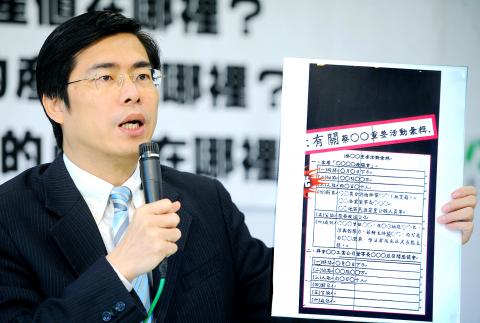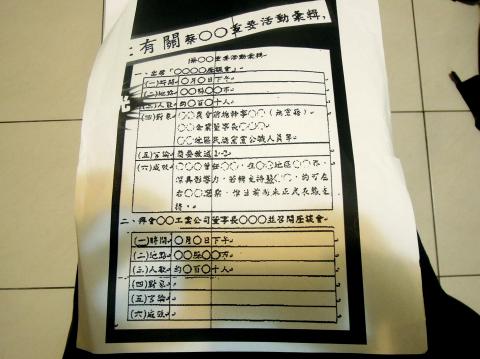The Democratic Progressive Party (DPP) yesterday condemned the intelligence authorities after allegations that they had been monitoring the party’s presidential candidate, Tsai Ing-wen (蔡英文), saying President Ma Ying-jeou (馬英九) should offer a clear explanation.
The Chinese-language Next Magazine yesterday reported that National Security Council (NSC) Secretary-General Hu Wei-chen (胡為真) had acted beyond his authority when he allegedly asked the Ministry of Justice’s Investigation Bureau to monitor Tsai in May.
Since Hu directly reports to Ma, who is seeking re-election as the Chinese Nationalist Party (KMT) candidate, Ma should explain whether he was aware of the illegal practice, Tsai said at a campaign stop in Kinmen.

Photo: Wang Min-wei, Taipei Times
“The President of the [Republic of China] ROC exploited government agencies to collect information to benefit his election campaign ... He is apparently capitalizing on the state apparatus for his own benefit and will have to be held accountable,” Tsai said.
At a press conference in Taipei, DPP spokesperson Chen Chi-mai (陳其邁) described the alleged practice as “Taiwan’s Watergate scandal,” as a president who is seeking re-election was suspected of abusing his power and ordering the intelligence authorities to monitor his opponents to benefit his election campaign.
According to the Next Magazine report, Weng Shih-tsan (翁詩燦), director of the NSC’s Secretariat, attended an intelligence meeting organized by the Investigation Bureau last week and took away information related to the presidential election, before submitting the information to Ma via Hu.

Photo: Lin Shu-hui, Taipei Times
The magazine’s report named 28 senior agents at the bureau, who it said were given the task of monitoring Tsai and submitting weekly reports on the times, locations and the attendees at Tsai’s campaign events.
The magazine said agents also made evaluations on the influence of local politicians or businesspeople who met with Tsai — KMT members and non-partisan representatives in particular — and predicted how many votes were at stake if they offered their support to Tsai.
It also cited an unidentified high-ranking official at the National Security Bureau (NSB) as saying that the NSC and Hu had ignored the intelligence system’s chain of command.
In response to the report, the NSC said that while it did send Weng to the meeting, he did not take any information away and no information had been submitted to Hu and Ma.
The NSB said in a press release that the NSC did not breach the chain of command.
The Investigation Bureau also denied the report. It said in a press release that it is one of the agencies responsible for the security of the presidential and vice presidential candidates, so naturally it knows about the candidates’ campaign activities. However, it said it does not get involved in the election, adding that while it analyzes and responds to the security situation, it does not offer the Presidential Office or the NSC candidates’ campaign information.
At a separate press conference, the DPP caucus criticized the alleged illegal monitoring.
On Dec. 23, 2008, Ma urged the Investigation Bureau’s agents to pledge loyalty to the country, the Constitution and the people, rather than the president or their superiors, DPP Legislator Lin Shu-fen (林淑芬) said.
Ma also said during a presentation last week that he would withdraw from the election if he “had resorted to the state apparatus for political oppression of his opponents,” Lin added.
Lin said she wondered whether Ma dared to make the same pledge again now that it was clear that the NSC, which is in charge of formulation and coordination of national security and defense policy, has become an agency that collects domestic election information.
When approached by reporters during a visit to a market in Greater Taichung, Ma said he had no knowledge about Tsai’s campaign schedule and he simply said “no” when asked whether he had instructed the NSC to collect information on Tsai.
Additional reporting by Rich Chang and Mo Yan-chih

INVESTIGATION: The case is the latest instance of a DPP figure being implicated in an espionage network accused of allegedly leaking information to Chinese intelligence Democratic Progressive Party (DPP) member Ho Jen-chieh (何仁傑) was detained and held incommunicado yesterday on suspicion of spying for China during his tenure as assistant to then-minister of foreign affairs Joseph Wu (吳釗燮). The Taipei District Prosecutors’ Office said Ho was implicated during its investigation into alleged spying activities by former Presidential Office consultant Wu Shang-yu (吳尚雨). Prosecutors said there is reason to believe Ho breached the National Security Act (國家安全法) by leaking classified Ministry of Foreign Affairs information to Chinese intelligence. Following interrogation, prosecutors petitioned the Taipei District Court to detain Ho, citing concerns over potential collusion or tampering of evidence. The

‘FORM OF PROTEST’: The German Institute Taipei said it was ‘shocked’ to see Nazi symbolism used in connection with political aims as it condemned the incident Sung Chien-liang (宋建樑), who led efforts to recall Democratic Progressive Party (DPP) Legislator Lee Kun-cheng (李坤城), was released on bail of NT$80,000 yesterday amid an outcry over a Nazi armband he wore to questioning the night before. Sung arrived at the New Taipei City District Prosecutors’ Office for questioning in a recall petition forgery case on Tuesday night wearing a red armband bearing a swastika, carrying a copy of Adolf Hitler’s Mein Kampf and giving a Nazi salute. Sung left the building at 1:15am without the armband and apparently covering the book with a coat. This is a serious international scandal and Chinese

Seventy percent of middle and elementary schools now conduct English classes entirely in English, the Ministry of Education said, as it encourages schools nationwide to adopt this practice Minister of Education (MOE) Cheng Ying-yao (鄭英耀) is scheduled to present a report on the government’s bilingual education policy to the Legislative Yuan’s Education and Culture Committee today. The report would outline strategies aimed at expanding access to education, reducing regional disparities and improving talent cultivation. Implementation of bilingual education policies has varied across local governments, occasionally drawing public criticism. For example, some schools have required teachers of non-English subjects to pass English proficiency

TRADE: The premier pledged safeguards on ‘Made in Taiwan’ labeling, anti-dumping measures and stricter export controls to strengthen its position in trade talks Products labeled “made in Taiwan” must be genuinely made in Taiwan, Premier Cho Jung-tai (卓榮泰) said yesterday, vowing to enforce strict safeguards against “origin laundering” and initiate anti-dumping investigations to prevent China dumping its products in Taiwan. Cho made the remarks in a discussion session with representatives from industries in Kaohsiung. In response to the US government’s recent announcement of “reciprocal” tariffs on its trading partners, President William Lai (賴清德) and Cho last week began a series of consultations with industry leaders nationwide to gather feedback and address concerns. Taiwanese and US officials held a videoconference on Friday evening to discuss the